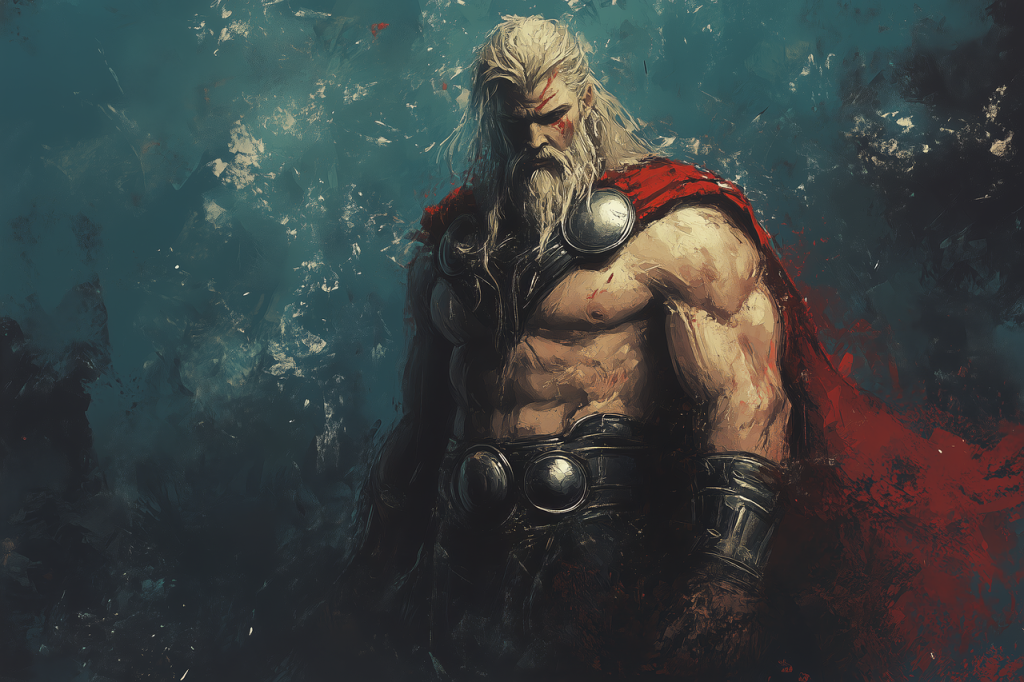When people search for the Greek god of thunder, many mistakenly think of Thor. But here’s the truth: Thor is not part of Greek mythology — he is the Norse god of thunder, worshipped by the Vikings. His closest counterpart in Greek mythology is Zeus, the mighty ruler of Mount Olympus who also controls thunder and lightning. The confusion comes from the similarities between these mythologies, where both cultures created powerful sky gods to explain storms and natural forces.
So why do people often connect Thor with Greek mythology? The answer lies in how mythology across different cultures often overlaps in symbols and roles, even when the gods themselves are different. Let’s dive deeper into Thor’s origin, powers, myths, and how he compares with Zeus.
Who is Thor in Mythology?

Thor is one of the most powerful figures in Norse mythology, known as a fearless protector of gods and humans. He is the son of Odin (the All-Father, similar to Zeus in Greek myths) and the goddess Jord. His character symbolized strength, loyalty, and courage — traits highly valued by the Viking warriors who honored him.
- Role: God of Thunder, storms, fertility, and protection
- Weapon: Mjölnir, a magical hammer that always returns to him
- Appearance: A strong warrior with red hair and beard, often riding a chariot pulled by two goats
- Worshippers: Vikings prayed to Thor for safety, good harvests, and strength in battles
Unlike many gods who were seen as distant or unpredictable, Thor was considered approachable and dependable, which made him especially beloved among ordinary people. Farmers, sailors, and fighters all called upon Thor’s blessing in their daily lives.
Key Myths About Thor in Norse Mythology
Thor appears in several legendary Norse stories, where his bravery and strength are constantly tested. Each myth shows different aspects of his personality, from his fierce warrior side to his clever trickster moments.
- Thor vs. Giants – He constantly fought the Jotunn (giants) to protect the world from chaos, proving himself as the ultimate defender of Asgard and Midgard. These battles highlighted the eternal struggle between order (gods) and chaos (giants).
- Thor and Jörmungandr – His destined battle with the world serpent during Ragnarök, the Norse apocalypse, is one of his most famous legends. It represents not just strength but the idea of inevitable fate that even gods cannot escape.
- The Hammer’s Theft – A giant once stole Mjölnir, and Thor had to disguise himself as a bride to retrieve it. This story shows his humorous side, proving that even a fierce thunder god could use wit to win.
Through these tales, Thor is shown as more than just a warrior; he is a protector, a symbol of resilience, and a force of balance against chaos.
Thor in Greek Mythology — The Zeus Connection
Thor himself does not exist in Greek mythology, but Thor himself does not exist in Greek mythology, but ancient Greeks had their own thunder god: Zeus. The two gods, though from different cultures, share many symbolic similarities.
- Zeus (Greek mythology): King of the gods, ruler of Olympus, controls thunder and lightning.
- Thor (Norse mythology): Protector of Midgard (Earth), wields the thunder hammer Mjölnir.
Both represent the raw, untamed force of nature and mankind’s attempt to understand and respect it. While Zeus was feared for his authority and divine justice, Thor was admired for his protection and strength in battle. Comparing the two gives us an insight into how different civilizations used mythology to explain the same natural phenomena.
Thor in Movies, Comics, and Pop Culture
Thanks to Marvel Comics and movies, Thor is now a household name across the world. The Marvel version shows him as an Avenger with Mjölnir and Stormbreaker, but this is a modern adaptation of the ancient Norse god.
Although this is a modern reimagining, it still borrows heavily from ancient myths, keeping Thor’s role as a powerful protector alive. These adaptations also spark interest in the original Norse legends, bringing mythology to a new generation of fans who may later explore the deeper cultural roots of the god of thunder.
Conclusion: Thor in Greek vs Norse Mythology
While Thor is not a Greek god, he shares striking similarities with Zeus, making it easy to see why people connect him with Greek mythology. Thor belongs to Norse mythology, but both Greek and Norse cultures shaped the image of a powerful god of thunder who rules the skies.
Exploring these myths side by side reminds us that, despite different cultures and regions, ancient people sought similar answers about the world around them. The thunder in the sky was a mystery to all — and gods like Zeus and Thor became humanity’s way of understanding it.
If you love exploring gods, myths, and legends, keep reading Mythology Stories for fascinating tales from Greek, Norse, Roman, and beyond. Each story opens a window into how our ancestors explained life, nature, and the mysteries of the universe.
